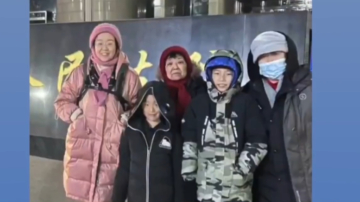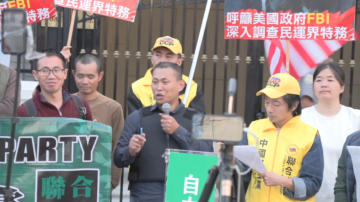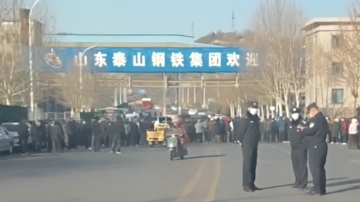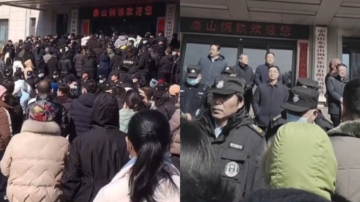【新唐人2013年09月11日讯】近年来,中国大陆不断爆出因政府暴力强拆、或非法占地,而引发的恶性事件以及群体性事件。官方调查显示,中国目前有越来越多强拆受害者采取极端方式,抗议政府的强拆行为。分析人士认为,依靠土地财政为生的中国各地方政府,随着债务量的增加,将会杀鸡取卵,剥夺更多农民赖以生存的土地,而这种做法极有可能导致矛盾激化,引发更大面积的冲突。
在中国大陆,如果询问各地访民上访的原因,十个访民中,最少一半以上的人回答是:“强拆问题”。可见,“拆迁征地”已经成为大陆社会矛盾的一个最突出的问题,尤其是“暴力拆迁”引发的群体性事件,近年来迅速增加。
人权网站“六四天网”创办人黄琦:“从2006年到现在为止,所有的群体性事件,因为农民拆迁征地而引发的正在呈现急剧上升趋势。从2011年到现在,我们所知道的因为农民土地征地问题而引发的群体事件,应该占中国大陆群体事件的百分之六十以上。”
从2000年开始,大陆各地政府在尝到土地财政带来的甜头后,从此一发不可收拾。轰轰烈烈的强拆运动在各地农村展开。
中国社会活动家胡佳:“地方政府利用他们控制的一系列的国家机器,它不是独立的主持公正,而是成为当权者手中的工具,搞土地的地方政府,都是强行征地,然后拿法院、警察来开路,使用暴力进行巧取豪夺。他们可以以很低价格掠夺农民的土地后,再翻上几十、上百倍转卖出去,落在腐败者钱袋里面,有些时候那些比例是怵目惊心的。”
中国各地因强征、强拆导致的自杀、自焚等恶性事件,近年来层出不穷,如四川成都唐福珍自焚事件、湖南洪江四农民“自杀控诉强拆”事件等。
黄琦:“当民间采取各种手法无法与官方对抗的时候,特别是他们通过各种渠道上访求助于中央政府和各地省、市政府而无助于问题解决的时候,他们不得不采取自杀的方法,所以说,从2006年到现在为止,大陆上因强征、强拆而引发的自杀案件正在急剧上升。”
胡佳:“他们有些人就喝了农药,上了吊,投了井、跳了河这样一系列的方式,我觉得这种事情在中国天天在发生。”
虽然各地“抗强拆的自杀性事件”不断,却极少有官员因此受到惩罚,大陆媒体也都被命令禁止报导这类事件。民众在发现自杀也无法捍卫自己的土地后,越来越多的中国百姓开始团结起来,拿起手中自制的武器,群体反抗政府掠夺土地。一时间,中国各地警民冲突、群众抗议不断,抗议的规模也在逐渐扩大。
胡佳:“中国老百姓大部分都善良,甚至有时候善良到懦弱,但是我觉得这里边也有有血性的人存在,肯定会加剧社会的那种暴力冲突、暴虐之气,这个没办法,你不给人家活路,人家只能铤而走险。另外一点,这种事情从个案会越来越多被人所知晓,有许多农民会在这里边结成维权的组织来进行反抗。”
在民众渐渐懂得要珍惜自己的生命,不再被动的选择自杀,而是有组织的站出来抵制政府强拆,维护自己的土地时,各地强拆碾死人的恶性犯罪事件也开始频现网路。
今年8月28号,福建省一个年仅4岁的女孩,在家人阻止当局强征土地时,被施工队推土机碾死。3月,河南中牟县、湖北巴东,四天之内,连续发生两名农民被强征方的施工车碾死事件。
对此,评论认为,随着当局暴力强拆手段的越发残忍,民间将会酝酿更大规模的反抗,中共当局将很快自食恶果。
采访编辑/ 张天宇 后制/钟元
Forced Demolitions Intensify "Mass Incidents"
"Mass incidents" or massive protests over forced demolitions
continue to occur in Mainland China in recent years.
According to official surveys, more and more civilians have
adopted extreme methods to protest forced demolitions
by local governments.
Analysts say local governments rely on taking land for revenue.
As debts continue to increase, local governments
will use any means to attain their goals, which can only
intensify conflicts and lead to a larger scale of confrontation.
In China, if you ask petitioners why they petition, at least half
of all petitioners will reply, "forced demolition."
In other words, land acquisition and resettlement
has become one of China's most obvious issues.
Particularly notable are the violent cases, which have led to
rapidly increasing mass protests in recent years.
Huang Qi, founder of human rights website 64Tianwang:
"From 2006 till now, all mass protests showed a sharp upturn.
Since 2011, we know that over 60% of mass protesters
are farmers protesting the land acquisition issue."
Since first tasting the sweet profits from land grabs in 2000,
China's local governments can no longer turn back.
Thus, the vigorous demolition campaign was launched
in various rural areas .
Chinese activist Hu Jia: "Local governments use state-control
apparatus as tools for land acquisition, instead of maintaining
fairness.
All local governments gain their land by forced acquisition.
They use the courts and police to open the way to allow
farmers to be violently removed.
They pay very low prices for the land, but sell to developers
for dozens or even over 100 times the original price.
It would be startling to know how much of that falling into
the pockets of corrupt officials.
Forced demolitions have led to many cases of suicide in China,
such as the self-immolation incident in Sichuan,
and suicide of four farmers in Hongjiang, Hunan province.
Huang Qi: "When common folks take up various tactics to
confront officials, they only do it after various channels
for petition have failed.
In other words, they have run out of recourse.
Thus, from 2006 to the present, suicidal cases due to forced
demolitions have sharply risen."
Hu Jia: "Some drank pesticide and some hanged themselves.
Some jumped into a well or into a river.
I think things like this happen every day in China ."
Although suicide over demolitions continue,
officials are rarely punished for them, and Mainland Chinese
media outlets are forbidden from reporting such incidents.
When people found suicide no longer working, they began
to unite together and fought back with homemade weapons.
For a time, clashes between police and civilians continued,
while the scale of protests also increased.
Hu Jia:"Chinese people are mostly good, but sometimes they
are kind and weak.
However, I believe that there are many passionate Chinese
and they would intensify the conflicts.
If you don't allow people to survive, they have no other choice
but to take the risk.
As more people are affected, more people will be aware.
Many farmers will team up with human rights groups to resist."
Gradually the people know how to cherish their own lives,
and they will not continue to commit suicide.
People will unite together and organize to resist
forced demolition and protect their land.
Recently, news about people being crushed by
demolition machinery has appeared more frequently.
On August 28, 2013, a family in Fujian Province tried to save
their home, and their four-year-old girl was killed by a bulldozer.
In March, 2013, two farmers from Henan and Hubei were
killed by construction machines.
In this regard, commentators say that the more forced
demolitions and the more cruel the methods,
the larger the scale of protests that will appear,
and the CCP will soon taste its own medicine.
在中国大陆,如果询问各地访民上访的原因,十个访民中,最少一半以上的人回答是:“强拆问题”。可见,“拆迁征地”已经成为大陆社会矛盾的一个最突出的问题,尤其是“暴力拆迁”引发的群体性事件,近年来迅速增加。
人权网站“六四天网”创办人黄琦:“从2006年到现在为止,所有的群体性事件,因为农民拆迁征地而引发的正在呈现急剧上升趋势。从2011年到现在,我们所知道的因为农民土地征地问题而引发的群体事件,应该占中国大陆群体事件的百分之六十以上。”
从2000年开始,大陆各地政府在尝到土地财政带来的甜头后,从此一发不可收拾。轰轰烈烈的强拆运动在各地农村展开。
中国社会活动家胡佳:“地方政府利用他们控制的一系列的国家机器,它不是独立的主持公正,而是成为当权者手中的工具,搞土地的地方政府,都是强行征地,然后拿法院、警察来开路,使用暴力进行巧取豪夺。他们可以以很低价格掠夺农民的土地后,再翻上几十、上百倍转卖出去,落在腐败者钱袋里面,有些时候那些比例是怵目惊心的。”
中国各地因强征、强拆导致的自杀、自焚等恶性事件,近年来层出不穷,如四川成都唐福珍自焚事件、湖南洪江四农民“自杀控诉强拆”事件等。
黄琦:“当民间采取各种手法无法与官方对抗的时候,特别是他们通过各种渠道上访求助于中央政府和各地省、市政府而无助于问题解决的时候,他们不得不采取自杀的方法,所以说,从2006年到现在为止,大陆上因强征、强拆而引发的自杀案件正在急剧上升。”
胡佳:“他们有些人就喝了农药,上了吊,投了井、跳了河这样一系列的方式,我觉得这种事情在中国天天在发生。”
虽然各地“抗强拆的自杀性事件”不断,却极少有官员因此受到惩罚,大陆媒体也都被命令禁止报导这类事件。民众在发现自杀也无法捍卫自己的土地后,越来越多的中国百姓开始团结起来,拿起手中自制的武器,群体反抗政府掠夺土地。一时间,中国各地警民冲突、群众抗议不断,抗议的规模也在逐渐扩大。
胡佳:“中国老百姓大部分都善良,甚至有时候善良到懦弱,但是我觉得这里边也有有血性的人存在,肯定会加剧社会的那种暴力冲突、暴虐之气,这个没办法,你不给人家活路,人家只能铤而走险。另外一点,这种事情从个案会越来越多被人所知晓,有许多农民会在这里边结成维权的组织来进行反抗。”
在民众渐渐懂得要珍惜自己的生命,不再被动的选择自杀,而是有组织的站出来抵制政府强拆,维护自己的土地时,各地强拆碾死人的恶性犯罪事件也开始频现网路。
今年8月28号,福建省一个年仅4岁的女孩,在家人阻止当局强征土地时,被施工队推土机碾死。3月,河南中牟县、湖北巴东,四天之内,连续发生两名农民被强征方的施工车碾死事件。
对此,评论认为,随着当局暴力强拆手段的越发残忍,民间将会酝酿更大规模的反抗,中共当局将很快自食恶果。
采访编辑/ 张天宇 后制/钟元
Forced Demolitions Intensify "Mass Incidents"
"Mass incidents" or massive protests over forced demolitions
continue to occur in Mainland China in recent years.
According to official surveys, more and more civilians have
adopted extreme methods to protest forced demolitions
by local governments.
Analysts say local governments rely on taking land for revenue.
As debts continue to increase, local governments
will use any means to attain their goals, which can only
intensify conflicts and lead to a larger scale of confrontation.
In China, if you ask petitioners why they petition, at least half
of all petitioners will reply, "forced demolition."
In other words, land acquisition and resettlement
has become one of China's most obvious issues.
Particularly notable are the violent cases, which have led to
rapidly increasing mass protests in recent years.
Huang Qi, founder of human rights website 64Tianwang:
"From 2006 till now, all mass protests showed a sharp upturn.
Since 2011, we know that over 60% of mass protesters
are farmers protesting the land acquisition issue."
Since first tasting the sweet profits from land grabs in 2000,
China's local governments can no longer turn back.
Thus, the vigorous demolition campaign was launched
in various rural areas .
Chinese activist Hu Jia: "Local governments use state-control
apparatus as tools for land acquisition, instead of maintaining
fairness.
All local governments gain their land by forced acquisition.
They use the courts and police to open the way to allow
farmers to be violently removed.
They pay very low prices for the land, but sell to developers
for dozens or even over 100 times the original price.
It would be startling to know how much of that falling into
the pockets of corrupt officials.
Forced demolitions have led to many cases of suicide in China,
such as the self-immolation incident in Sichuan,
and suicide of four farmers in Hongjiang, Hunan province.
Huang Qi: "When common folks take up various tactics to
confront officials, they only do it after various channels
for petition have failed.
In other words, they have run out of recourse.
Thus, from 2006 to the present, suicidal cases due to forced
demolitions have sharply risen."
Hu Jia: "Some drank pesticide and some hanged themselves.
Some jumped into a well or into a river.
I think things like this happen every day in China ."
Although suicide over demolitions continue,
officials are rarely punished for them, and Mainland Chinese
media outlets are forbidden from reporting such incidents.
When people found suicide no longer working, they began
to unite together and fought back with homemade weapons.
For a time, clashes between police and civilians continued,
while the scale of protests also increased.
Hu Jia:"Chinese people are mostly good, but sometimes they
are kind and weak.
However, I believe that there are many passionate Chinese
and they would intensify the conflicts.
If you don't allow people to survive, they have no other choice
but to take the risk.
As more people are affected, more people will be aware.
Many farmers will team up with human rights groups to resist."
Gradually the people know how to cherish their own lives,
and they will not continue to commit suicide.
People will unite together and organize to resist
forced demolition and protect their land.
Recently, news about people being crushed by
demolition machinery has appeared more frequently.
On August 28, 2013, a family in Fujian Province tried to save
their home, and their four-year-old girl was killed by a bulldozer.
In March, 2013, two farmers from Henan and Hubei were
killed by construction machines.
In this regard, commentators say that the more forced
demolitions and the more cruel the methods,
the larger the scale of protests that will appear,
and the CCP will soon taste its own medicine.








